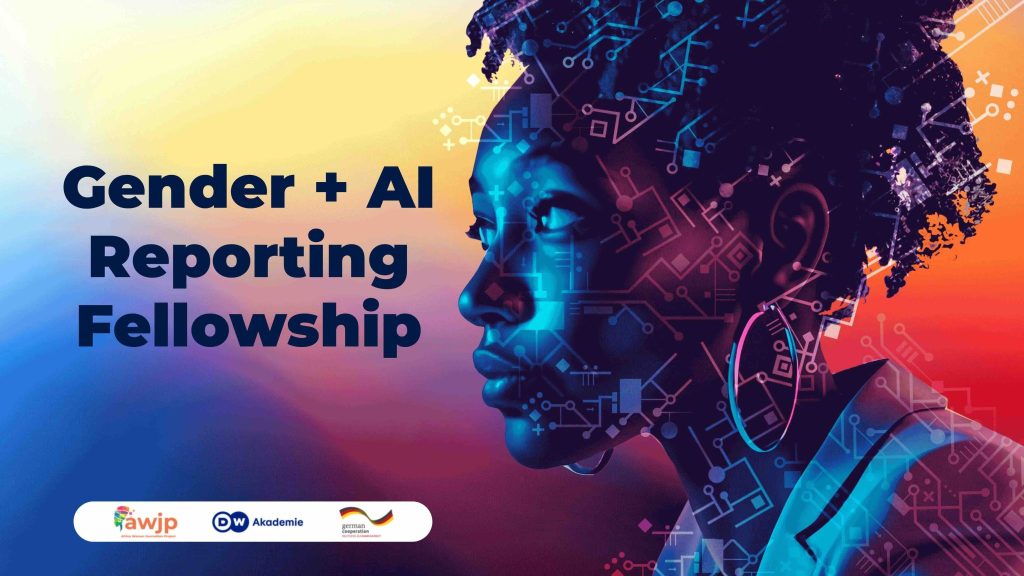Call for Applications: Gender + AI reporting fellowship for women journalists in Kenya

Gender + AI Fellowship poster illustration
Artificial Intelligence (AI) systems increasingly shape the information we consume, the tools we use, and the way we see the world.
Drawing from vast digital sources, AI reflects the biases, stereotypes, and inequities that exist across society, often reproducing them in algorithms, imagery, and narratives.
Yet at the same time, AI also holds immense potential to surface and challenge these inequalities, especially when applied thoughtfully in journalism.
To support gender-aware reporting on emerging technologies, the African Women Journalism Project (AWJP) and DW Akademie have launched a new initiative: the Gender + AI Reporting Fellowship.
This program is designed to help Kenyan women journalists explore how artificial intelligence influences gender dynamics and how AI tools can be used to amplify inclusive, data-informed storytelling.
A Program for Journalists at the Intersection of Gender and Technology
The fellowship is open to early and mid-career women journalists in Kenya who are eager to build their reporting capacity, expand their technical skills, and apply new methods to uncover hidden patterns and bias.
Participants will explore how AI technologies affect women and gender-diverse communities, with attention to topics like tech policy, surveillance, data justice, access, inclusion, governance, health, climate, and education.
Through a combination of virtual trainings, mentorship, editorial coaching, and production support, the program will equip selected fellows to use AI as a reporting tool while centering underreported gender stories in the digital age.
Fellowship Structure
Duration: 4 months (October 2025 – February 2026)
1. Training Phase
- Online learning sessions covering AI literacy, gender-sensitive journalism, and the social impacts of AI
- Facilitated by experienced journalists, editors, and AI practitioners from AWJP and DW Akademie
2. Mentorship Phase
- Dedicated one-on-one mentorship with senior media professionals
- Pitch refinement, editorial support, and storytelling guidance
- Support with data analysis and visualization techniques
3. Fellowship Phase
- Fellows will develop and publish original journalism projects with financial and technical support
- Continued editorial assistance, data guidance, and design mentorship throughout production
4. Showcase & Networking
- Final presentations of completed projects
- Networking opportunities with other fellows, media houses, and sector partners
Expected Output
Each fellow is required to produce a minimum of four high-quality, original stories during the fellowship period.
These stories must center on the intersection of gender and AI, and explore the broader implications of technology within key development areas such as health, education, governance, finance, and climate change.
All stories must be completed and published within the four-month fellowship window.
Eligibility Criteria
This opportunity is open to women journalists based in Kenya, whether affiliated with a media organization or working independently.
Professional Affiliation
- Journalists working in TV, radio, print, or digital media outlets
- Roles may include reporters, editors, producers, moderators, or social media content managers
- Freelancers who meet all other criteria are eligible
Geographic Location
- Applicants must be based in Kenya
- Priority will be given to candidates from Nyanza, Western, Rift Valley (including Turkana), Central, and Coastal regions
Technical Requirements
- Proficiency in English (spoken and written)
- Access to a laptop or desktop computer and a stable internet connection
Publishing Commitment
- Applicants must include a letter of intent to publish from a media outlet or editor
- Fellows are expected to publish their stories within two weeks of completion and submit audience engagement data
Topical Interest & Motivation
- Demonstrated interest or experience in reporting on gender and/or technology
- A clear motivation to use journalism as a tool to advance the rights of women, girls, and marginalized communities
- Willingness to learn and apply AI tools for gender-responsive reporting
Fellowship Benefits
- Microgrants to support story production
- Access to AI tools relevant to data-driven journalism
- Mentorship from leading Kenyan and international media experts
- Editorial, data, and design support throughout story development
- Publishing visibility via AWJP and partner platforms
- Networking opportunities with professionals across the journalism and tech sectors
- Certificate of Completion
Selection Process
Applications will be reviewed based on the following criteria:
- Clarity, relevance, and originality of the proposed story idea
- Demonstrated interest in gender or AI-related topics
- Passion for journalism and commitment to advancing inclusive storytelling
- Diversity of applicants by region, topic, and media sector
Shortlisted candidates may be invited to participate in a virtual interview.
How to Apply
Applicants must complete and submit the online application form accessible at https://theawjp.org/call-for-applications-gender-ai-reporting-fellowship/and upload the following:
- A current Curriculum Vitae (max 2 pages)
- 1–2 published work samples (links or PDFs)
- A 300-word story pitch outlining the idea to be developed during the fellowship
- A motivational statement (maximum 500 words)
- A letter of intent to publish from a confirmed editor or media outlet
🗓️ Application Deadline: 20 August 2025
📧 Contact for inquiries: contact@theawjp.org
Be part of a new generation of women journalists leading the conversation on AI and gender in Africa. Apply today and make your voice count.
About the Organizers
The African Women Journalism Project (AWJP) empowers women journalists across the continent to produce data-driven, gender-sensitive, and impactful journalism.
Through mentorship, story grants, and cross-border collaboration, AWJP supports storytelling that promotes social justice, exposes inequality, and holds power to account.
The initiative focuses on under-reported issues affecting women and marginalized groups, with a strong emphasis on media innovation and development.
DW Akademie is Deutsche Welle’s center for international media development and journalism training.
Active in around 70 countries, DW Akademie works to strengthen freedom of expression, access to information, and independent journalism worldwide.
It is a strategic partner of Germany’s Federal Ministry for Economic Cooperation and Development (BMZ), and also receives support from the Federal Foreign Office and the European Union.



